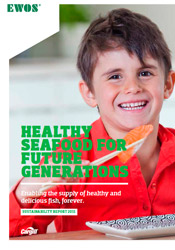Healthy seafood for future generations
Cargill releases the EWOS 2015 sustainability report
June 08, 2016
The global need for food is growing, and the need for protein is expected to increase by 70 percent worldwide by 2050. Cargill believes that farmed seafood offers one crucial solution to meeting this demand, as fish is the most resource-efficient animal protein available to humans, aside from insects.
The company’s EWOS brand is one of the world’s largest suppliers of salmon feed and nutrition for the aquaculture industry. In its 2015 sustainability report, EWOS outlines how it is working to enable the supply of healthy and delicious fish for generations to come.
“As a producer of feed for aquaculture, we often meet the misconception that sustainability equates to footprints,” said Einar Wathne, president of Cargill Aqua Nutrition. “However, sustainability is far more than that. It is about meeting the needs and aspirations of the present, without compromising the ability of future generations to meet their own needs.”
 The detailed report covers an array of important sustainability topics and trends.
Wathne explains that sustainability has three dimensions – economic, environmental and social – and that these dimensions are mutually dependent and need to be balanced. “It is our responsibility to operate sustainably, and also to continuously strive to reduce our footprint,” he said. “The details on how we do that are described in this report.”
The detailed report covers an array of important sustainability topics and trends.
Wathne explains that sustainability has three dimensions – economic, environmental and social – and that these dimensions are mutually dependent and need to be balanced. “It is our responsibility to operate sustainably, and also to continuously strive to reduce our footprint,” he said. “The details on how we do that are described in this report.”
The detailed report covers an array of important sustainability topics and trends – including resource depletion, climate change, fish health challenges, consumer concerns, and growing demand for protein – and explains what the company is doing to make measurable progress in its key sustainability indicators.
“Consumers want to know where their food is coming from, what it is made of and how it is produced,” said Wathne. “Whether we are developing new technologies, sourcing new raw materials or innovating new feeds, the need for transparency in everything we do is fundamental. This is why we report to such a detailed extent on our sustainability performance.”
Some key highlights:
- Reducing marine dependence. Over the last 10 years, EWOS has reduced the marine index dramatically from 55 percent in 2005 to 27 percent in 2015, while at the same time increasing feed production by 70 percent.
- Use of more fish trimmings. In 2015, 32 percent of the marine ingredients used in EWOS feeds were from fish trimmings – an increase of almost 10 percent in five years. Trimmings and by-products from fish are an ideal raw material for fish feed – they’re natural food for fish, often can be sourced locally, and turn materials that otherwise would have gone to waste into healthy and delicious food.
- Cooler production. Through a number of investments in renewable energy and more efficient technologies, the company has successfully reduced its greenhouse gas emissions per ton of feed produced by more than 11 percent since 2013.
In addition to outlining key sustainability metrics, the report includes information about how the company engages with a diverse range of stakeholders, including employees, customers, communities, governments, NGOs and industry associations, to be a responsible and reliable employer and partner.
“We are honored to have a role in addressing how to feed the world and at the same time, protect the planet,” said Wathne. “In short, our commitment is to provide healthy seafood for future generations.”
